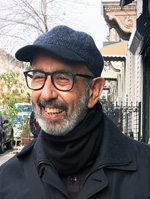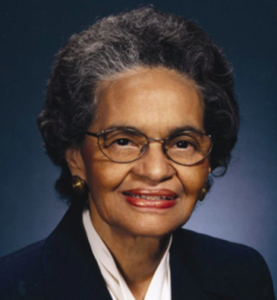By Michael Ginsberg

LOUISVILLE, Kentucky — Viola Taliaferro has earned an exalted place in Bloomington, Indiana, where she and her late husband, George, stand as civic royalty.
Judge Taliaferro’s actions fit Sir Jonathan Sacks’ description of the ethics of responsibility. In To Heal a Fractured World, Rabbi Sacks writes:
We are here to make a difference, to heal the fractures of the world, a day at a time, an act at a time, for as long as it takes to make it a place of justice and compassion where the lonely are not alone, the poor not without help, where the cry of the vulnerable is heeded, and those who are wronged are heard.
Viola Taliaferro’s actions have changed my life by saving the life of a young man who had become part of our family. My wife, Jeri Swinton, and I moved to Bloomington in the fall of 1985, when Jeri was hired as CEO of Big Brothers Big Sisters of Bloomington, and I enrolled in a Ph.D. program at Indiana University.
The following spring, I volunteered as a Big Brother and was matched with 10-year-old Donald, who lived in a rundown trailer court outside of Bloomington. We remained officially matched for two years, at which time Jeri and I moved to Louisville, where she became CEO of Big Brothers Big Sisters of Kentuckiana, and I was hired as a professor at Jefferson Community College.

Although I was no longer officially Donald’s Big Brother, we remained close and visited each other often. About the time he turned 20, however, he grew distant, and Jeri and I worried that he didn’t want us to know what had changed in his life. As we eventually found out, he had become involved with some unsavory characters and had turned to small-time crime. He also became a father, and the mother of his child died under suspicious circumstances. We rarely heard from or about him during that chapter in his life, until we received a telephone call that he had been shot in the head (also under suspicious circumstances) and was comatose.
Donald survived, with a serious brain injury, and Jeri and I resumed a more active role in his life, remaining suspicious of his activities. Through another phone call, we later learned that Donald was about to be sentenced for serious crimes that were never fully explained to us in detail. Jeri and I agreed to make an offer to the court to take custody of Donald. We both knew a different young man than “convicted criminal” and were confident that he posed no risk to us.
I drove to Bloomington and asked Donald’s public defender to explain our offer to the sentencing judge. That was my introduction to Viola Taliaferro. I had known her only as the wife of George Taliaferro, an IU football star, the first black football player to sign an NFL contract, and, later, a teacher at IU and a civic leader. He died in 2018.
I did not meet Judge Taliaferro at the sentencing, but I watched as she first read Donald the riot act, then explained what Jeri and I had offered. In a tone equal parts parental and judicial, Judge Taliaferro told Donald she would agree to the arrangement, under the strict condition that he never again step foot in Indiana. If he did, she warned him, she would send him to prison.
I drove Donald to Louisville, where he lived with us for a year. Jeri and I called a lawyer friend, who said the judge had no authority to ban Donald from Indiana. We decided the bogus ban was a good idea, and we never told Donald. He had to think he was leaving Bloomington behind forever.
The arrangement worked out far better than we expected. Donald attended substance abuse sessions, got a job, and earned his GED diploma, an achievement we celebrated at our house with Donald and his family. His mother and young son moved to Louisville, and Donald did a wonderful job raising his son as a single parent. He became an international ju-jitsu champion and now is part owner of a gym in Nashville, Tennessee. (I did drive Donald to Nashville, Indiana. once to visit his grandmother. We never discussed the judge’s order to stay out of Indiana, and he has since “violated” her order without incident.)
I have told Donald many times that he is a hero to me, for the life he has built for himself and his son. Now married and devoted to his wife, who suffers from multiple health problems, Donald also is devoted to us and thanks us on every possible occasion for every possible reason.
About five years ago, during one of our occasional visits to Bloomington, Jeri and I called Judge Taliaferro and asked if we could visit to tell her a story from her courtroom. She graciously invited us to her house, where she and George were wonderful hosts. I told the now-retired jurist about Donald and asked her if she knew she had no authority to ban him from Indiana. With a full-throated laugh, she said, “It was my courtroom; I could say whatever I wanted.” Then she explained her judicial philosophy. “I considered the young people before me to be standing on a cliff. I could push them off or try to pull them back in. If I could save them, that’s what I would do.”
I am convinced that Donald would have died in prison. Judge Taliaferro saved his life. So, Donald, sorry but you are not my undisputed number one hero; you are tied for number one with Viola Taliaferro.
*
Michael Ginsberg, Ph.D., is a freelance writer and a professor of English based in Louisville, Kentucky.